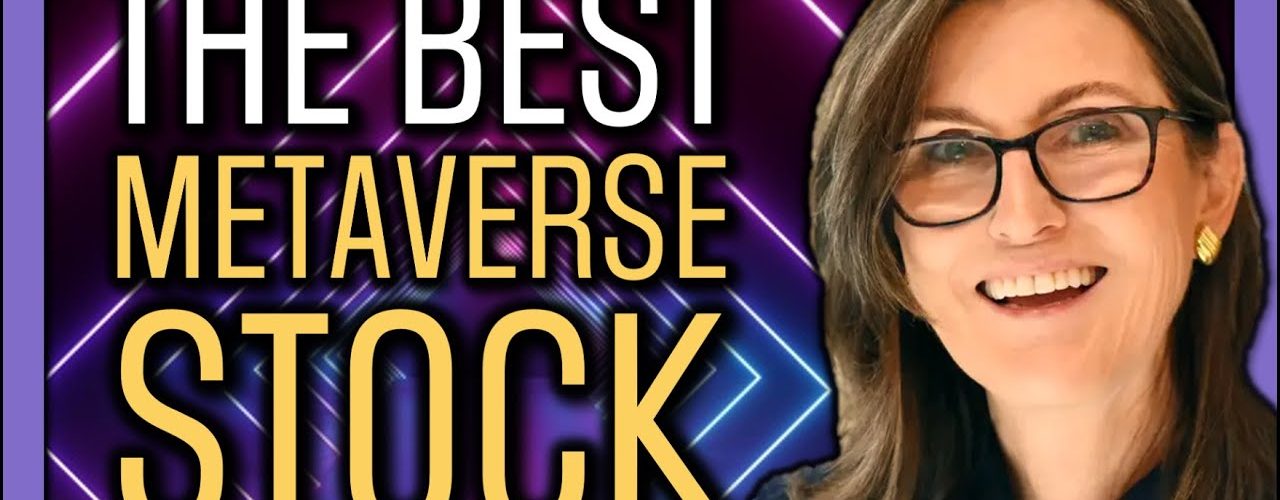Mentioned in Video:
- 🥽 ARK Invest Big Ideas 2021 | Virtual Worlds Will Be HUGE: https://www.youtube.com/watch?v=6xH_sCA6XOc
- 💡 ARK Invest's BIG IDEAS 2021 | RIP Intel, Innovations in AR/Gaming, AI Rules the World: https://www.youtube.com/watch?v=hLnOoXopfow
- Facebook (FB stock) Q2 2021 Earnings Call Transcript: https://seekingalpha.com/article/4442353-facebook-inc-fb-ceo-mark-zuckerberg-on-q2-2021-results-earnings-call-transcript
- ARK Invest's 2021 Big Ideas Report: https://ark-invest.com/big-ideas-2021/
- Support the channel and get extra member-only benefits by joining us on Patreon: https://www.patreon.com/tickersymbolyou
🤩 This is the best #Metaverse stock besides #Facebook (now #Meta). #CathieWood has been loading up many #ARKInvest funds with #Unity stock ($U), with over $1.2 BILLION of it across #ARKK, ARKW, ARKQ, and even ARKX. Yet, when I look online, I don't see anyone talking about the future of Unity Software stock outside of video games or what their real differentiators are. Let me explain why I think @ARK Invest keeps buying Unity and why U stock could be one of the best stocks to buy now, even above #Facebook Stock (#FB stock).
Video Transcript:
00:00
So, let's talk about Unity Software, ticker symbol U. I'll try to keep the jokes to a minimum.
00:06
Unity IPOed on September 18th 2020 at around a $20 billion dollar market cap, closing at around $73
00:14
dollars per share. During its initial rally over the holidays, ARK Invest slowly averaged up until
00:19
Unity represented about 1% percent of all of their actively managed dollars. As its
00:24
price crashed after the first week of February, they began aggressively loading up on the stock.
00:29
Today, Cathie Wood is holding over one and a quarter billion dollars of Unity Software
00:33
across ARKK ARKK, ARKW ARKW, ARKQ ARKQ and ARKX ARKX, making it ARK Invest's 8th biggest
00:39
position overall, out of about one hundred and seventy-fivestocks. Over the last month alone,
00:44
Cathie Wood has increased her position in Unity Software by well over 10% percent,
00:49
while her total assets under management shrank by more than 10% percent over the same period.
00:54
To me, that speaks very highly of Cathie Wood's conviction in Ticker Symbol:
00:58
U. This is going to be a fun episode. (Sorry)
01:01
The thing that I think all of Cathie Wood's biggest positions have in common
01:04
is that most investors are misunderstanding at least part of the bigger picture,
01:09
so I'd like to talk about what Unity Software does today, how it fits into this bigger picture,
01:14
and some of the things that make it a unique competitor and investment. Full disclosure,
01:19
I don't own any Unity stock except through my sizeable position in ARKW, but may pick
01:25
up shares in the very near future as a result of this research. Let's dive right into it.
01:30
Today, Unity Software allows developers to create 2D and 3D interactive experiences for every type
01:37
of platform, including PCs and Macs, gaming consoles, and mobile devices. Their primary
01:42
audience right now is game developers, but I'll show you in a bit that they're extending
01:47
their development ecosystem to support much more than just video games. The thing Unity's
01:52
platform focuses on is lowering the barrier of entry to develop these visual experiences,
01:57
kind of like how Shopify, ARK Invest's 4th biggest position, lowers the barrier of entry to create
02:03
online businesses. Both, Unity and Shopify, remove most of the need to learn how to code
02:08
in order to participate in their respective markets. In Unity's case, that means artists,
02:13
storytellers, and other types of content creators can start bringing their vision to life much
02:18
faster instead of having to learn a skill that's very different from their existing skillset.
02:23
Also, Unity's business model and their software are very scalable. Unity supports everyone from
02:29
huge studios that make multiplayer games requiring powerful computers all the way down to individual
02:35
creators who just want to make a simple mobile game. The way I see it, Unity
02:40
Software's business falls into three categories. The first is called Create Solutions. These are
02:45
the tools that developers, artists, designers, engineers, or architects use to create the actual
02:51
2D or 3D content. Unity's core products are available for free for smaller developers,
02:56
which include the development platform itself and the visual scripting tools that let creators
03:01
start building their content without needing to code. The second category of Unity's features
03:06
is called Operate Solutions. These are all the things related to operating a game that aren't
03:11
necessarily part of the core gameplay loop itself. This includes things like hosting
03:15
services for multi-player games and supporting voice chat between players. This also includes
03:21
tools that help creators monetize their content through advertisements or in-app purchases.
03:26
There are two special things about Unity's Operate Solutions. First, even if a creator isn't using
03:32
Unity's Create Solutions to build their actual game, they can still use Unity's Operate Solutions
03:37
to manage all of these other features around it. In fact, Unity has a service called Unity Ads,
03:43
which is its own mobile advertising platform and auction system that anyone can plug into and
03:49
directly compete with Google's ad services in that space. Second, Unity follows a revenue sharing
03:54
model, where they take something like a 5% percent cut of the client's revenue when it reaches
03:59
a certain threshold. That way, Unity directly scales with the revenue growth of their successful
04:04
clients, which keeps their incentives aligned with their customers. I really like that.
04:09
Speaking of aligning with their customer base, Unity's platform follows
04:12
a develop-once-deploy-everywhere model where creators can deploy their work to Playstation,
04:18
Xbox, Nintendo, MacOS and iOS, and Android and Windows. This is a big selling point.
04:24
That means different operating system and device makers need to enter into long-term partnerships
04:29
with Unity Software, to ensure that creators don't have to learn to write any extra code
04:34
just to get their projects onto one specific platform. As a result,
04:38
Unity's platform has become an industry-standard content creation tool. By their own estimates,
04:44
over half of the top 1,000 mobile games in Apple’s App Store and on Google Play
04:49
have been created using Unity’s solutions. Additionally, its platform has been used to
04:53
develop nearly 60% percent of the AR and VR content, including viral mobile experiences
05:00
like Pokemon Go. In fact, something like 90% percent of the content on emerging AR platforms
05:05
is made using the Unity engine. I'll get back to this 90% percent number later in the episode.
05:10
Going back to the strategic partnerships I mentioned, 94 of the top 100 global game
05:10
development companies are Unity's customers, including Sony, Nintendo, Microsoft,
05:10
Electronic Arts, Tencent, Activision Blizzard. Unity's Create Solutions,
05:12
Operate Solutions, and Platform Partnerships work together to form an end-to-end solution that isn't
05:17
easy to replicate by other visualization engines, making it a pretty big moat.
05:23
There's one more thing I want to say about gaming before I talk about the
05:26
other industries that Unity operates in. It turns out that, over the last decade,
05:31
the gaming industry in general has been growing by about 10% percent per year and mobile gaming
05:36
specifically has been growing by almost 25% percent per year. So, gaming is a huge, rapidly
05:41
growing market that's going to soon surpass $200 billion dollars of revenue per year.
05:46
The reason I'm making a separate callout for mobile gaming is because when Unity started, it
05:51
differentiated itself from its biggest competitor, Unreal engine, by focusing on supporting mac games
05:57
and mobile games. As a result, Unreal engine powers some of the biggest PC and console games,
06:02
like Fortnite and Rocket League, while Unity powers some of the most popular mobile games,
06:07
like Hearthstone and Pokemon Go. Any way you slice the gaming industry,
06:09
it's a winner-take-most market with only a few companies at the top.
06:09
This shift to mobile gaming is actually part of a larger shift to mobile everything. In fact,
06:15
the amount of time people are spending on smartphones has increased by almost 30% percent
06:20
in the last 3 years and time spent on tablets has increased by over 40% percent in that same
06:24
time frame. More people are doing more work from mobile devices more often, including professions
06:25
like architecture, design, engineering, product prototyping, and more. Likewise, Unity’s total
06:27
addressable market extends to industries beyond gaming. They are consistently investing to
06:32
expand their platforms to cater to industries like architecture and engineering 3D designs,
06:37
automotive designs, 3D film and animation creation. Today,
06:41
less than 10% percent of their biggest customers are from industries outside of gaming,
06:45
but I think this is a large opportunity for Unity in the long term. Unity's platform
06:49
is used by 8 out of the top 10 architectecture, engineering, and design companies in the world,
06:49
as well as 9 out of the top 10 automotive companies like Honda, Volvo, and BMW.
06:50
Think about all of the applications for this kind of software outside of
06:53
gaming. Architects and automotive engineers can build digital twins of their buildings and
06:58
cars and start running tests on their digital models. Swapping out parts,
07:02
trying different materials, seeing how different parts and sub-assemblies fit and work together,
07:07
or even simulating the customer experience can all be done in a shared digital workspace
07:12
instead of through physical models and prototypes, which are expensive to build and much harder to
07:17
update. Think about real-estate applications where you want to place furniture in a home
07:22
to stage a virtual walkthrough and can rearrange the house in an infinite number of ways with the
07:27
push of a button, or even randomize the layout of a house altogether. Remember, for all of
07:33
these industries, Unity Software is providing a solution that lets people do most of these
07:38
things with minimal code, so these professionals don't have to learn new, separate skill to start
07:44
implementing these solutions.This idea of low-code creation of virtual environments and digital twins
07:50
brings us right into the vision of Unity Software's future, which I think has two parts.
07:53
The first part is fairly straightforward; they will keep reinvesting into their Create Solutions,
07:58
Operate Solutions, and Strategic Partnerships to scale with the mobile gaming market and continue
08:04
grow their customer base in other industries beyond gaming. I'll talk more about this
08:08
in a separate episode, only because Unity Software reports earnings in less than a week,
08:13
so we see how well they're actually doing with this. Comment below or tweet me at
08:18
ticker symbol you with anything you'd like me to cover in this follow-up episode on
08:22
Unity's financials. Do you want me to talk more about any specific offerings or
08:23
their biggest clients or competitors? I'm excited to hear your thoughts.
08:25
The second part of Unity's future is the more exciting part,
08:28
at least to me. Unity Software is in the pole position to be THE
08:32
development platform for virtual worlds. I really believe that this isn't just a
08:36
pipe dream. Let me set the stage with this short clip from 60 Minutes and Paramount.
08:46
Remember, Unity Software has positioned itself as
09:30
the dominant player in interactive mobile, virtual, and augmented reality experiences.
09:31
Those experiences are ALREADY having huge impacts in surgery, mental health, and industrial design.
09:32
If you're interested in learning more about how VR and AR are already beginning to sweep
09:32
these industries, check out my episode on Virtual Worlds. I'll leave a link to that in
09:34
the top right-hand corner of your screen right now and in the description below as well.
09:36
Okay, I get it, you're probably thinking this whole metaverse thing is a wonky idea that a
09:41
few game companies are pushing as a way to get more people to buy into virtual and augmented
09:46
reality products, which is still decades away from being a reality. Uh, a real reality, not a virtual
09:53
reality. Wait. Since that 60 minute clip claimed that the metaverse will be the new social network,
09:59
don't we turn to the king of current social networks and see whether or not he has anything
10:03
good or bad to say about this technology? Here's a quick clip of Mark Zuckerberg,
10:08
the CEO of Facebook, in an interview with Marques Brownlee last fall.
11:39
So, Facebook is dedicating thousands of people to virtual and augmented reality because they
11:44
see it as the next frontier for computing and the internet. Facebook also owns Oculus, a major
11:49
player in VR headsets, games, and equipment. Here's an interesting fact: Facebook just reported
11:55
earnings and during the call, the word metaverse was mentioned TWENTY TIMES. For reference,
12:00
the word advertising was mentioned twelve times. I've linked the transcript of their call in the
12:05
description below, check it out for yourself. I'm extremely bullish on the metaverse and, actually,
12:12
so is ARK Invest. Since I'm saving the financials for Unity Software's earnings call in less than
12:16
a week, let me wrap up by showing you ARK Invest's stance on this market as a whole.
12:22
If we go back to ARK Invest's Big Ideas report, the third big idea was Virtual Worlds. Virtual
12:27
worlds today are in their infancy, but according to ARK's research, revenues could compound at a
12:32
17% percent compound annual growth rate over the next 5 years. The culmination of these virtual
12:38
worlds will ultimately be this Metaverse. Over the last 10 years, gaming revenue has shifted
12:43
toward in-game purchases. By 2025, 95% percent of global gaming revenue could be coming from in-game
12:50
purchases, according to ARK. Right now, this is happening primarily through microtransactions
12:54
in mobile games, but the obvious implication is that this will also be true for virtual goods,
12:59
services, and assets inside the metaverse. ARK Invest also believes that the average time a
13:04
person spends playing video games will increase by over 30% percent in the next five years, further
13:09
compounding in-game revenue by that amount. More time playing means more time spending. That's
13:14
what's responsible for the exponential growth of virtual gaming revenue in their bull case.
13:19
Market leaders like Snapchat, Apple, and of course Facebook, are investing heavily in augmented
13:24
reality, encouraging widespread use of AR tools on existing mobile devices, as well as consumer-grade
13:31
AR glasses, like Snapchat's Spectacles, which are currently a hardware platform built for creators
13:37
looking to push the limits of immersive augmented reality experiences. As a result of products like
13:42
this, the total AR market could scale from under 1 billion dollars today to 130 billion
13:48
dollars by 2030, a compound annual growth rate of over 60% percent for the next decade.
13:53
Even if you think ARK Invest's projection is off by five years, that would still be an
13:58
almost 40% percent compound annual growth rate for the next 15 years. The next step after AR
14:03
is VR. Based on the declining costs of VR headsets and immersive software, like Facebook's Oculus
14:09
products, ARK Invest predicts that mass-market products offering complete visual immersion could
14:15
hit smartphone-like adoption in 2030. Again, even if they're off by 5 years, we're talking about
14:21
getting in front of an industry the size of smart phones today. In my opinion, eventually, even
14:26
bigger, since AR and VR will eventually be able to simulate phones and tablets, removing the need
14:32
to own real ones, just like Nintendo emulators on computers remove the need to own a real one today.
14:38
When you add all of these factors up – the increased time spent gaming, the increased
14:38
amount of in-game spend, new AR capabilities on smart phones, followed by AR glasses,
14:38
then full immersion with mature VR capabilities at scale – we're looking at a huge compound annual
14:38
growth rate. Remember when I said 90% percent of the content on emerging AR platforms is made
14:43
using the Unity engine? This rapidly growing market is currently Unity Software's to lose.
14:49
Like I mentioned earlier, the other major non-proprietary game engine is the Unreal
14:53
Engine. Unreal is owned by Epic Games, which isn't currently publicly traded,
14:58
but guess who owns 40% percent of it? Tencent, ticker symbol T C E H Y, which ARK Invest is
15:04
aggressively divesting from ever since the start of these Chinese Regulatory crackdowns.
15:09
Tencent was ARK Invest's 26th biggest position at the start of June,
15:13
with almost half a billion dollars in it. Today, ARK Invest has just one tenth of that in Tencent,
15:18
making it their one hundred and twenty eighth biggest position overall.
15:22
Yikes! Apple and Epic are also still in a big legal battle over microtransactions and
15:23
platform fees on the iOS version of Fortnite. By the way, I'm not saying
15:24
Tencent or Epic Games are bad companies or that Unreal engine an inferior product,
15:30
but I do think Unity is currently positioned to be the better and safer long-term investment for
15:36
developing experiences on mobile, augmented reality, and virtual reality platforms.
15:41
Comment below with your thoughts on Unity Software's business today
15:44
and what you think about augmented reality, virtual reality,
15:48
and the metaverse. Do you think it's the next step in computing and social networking, or
15:52
does your vision of the future go in a different direction? I'm excited to hear your thoughts.
15:57
Either way, I hope this episode helped you understand more about Unity Software's business
16:02
today, their potential in markets outside of gaming, and their role in what could be the
16:03
future of the internet and computing. If it did, let me know by investing in the like button and
16:05
subscribing to the channel with all notifications turned on. That way, you'll be the first to know
16:06
when my episode covering Unity's upcoming earnings call comes out AND it's a great way to invest
16:08
in the channel that invests in you. A special shoutout to my patrons on patreon and channel
16:09
members right here on YouTube — I wouldn't have thought to make this episode without you.
16:10
Until next time, this is ticker symbol you,
16:11
my name is Alex, reminding you that the best investment you can make, is in you.
If you want to comment on this, please do so on the YouTube Video Here














